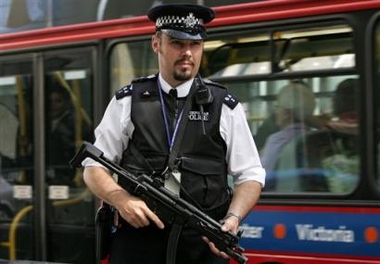|
Two women charged in London bomb probe
(AP)
Updated: 2005-08-05 09:00
British police investigating the botched London subway attack of July 21 said Thursday they had charged two sisters for failing to disclose information under anti-terror laws, reported Associated Press.
The city's nerves were further rattled by a message from al-Qaida warning of more bloodshed, but people made efforts to carry on.
In a show of force, officers armed with submachine guns patrolled uncrowded subway stations and police helicopters hovered over city streets as one of the busiest Underground lines reopened Thursday — four weeks to the day after suicide bombers killed 52 people.

An armed police officer on duty in central London as a bus passes by, Thursday Aug. 4, 2005. [AP] |
Undercover officers mixed with a lighter-than-usual load of subway commuters — many Londoners no doubt mindful that terrorists had attempted similar attacks exactly two weeks after the deadly July 7 transit bombings.
"People didn't seem frightened or apprehensive, they were just reading their newspapers and getting on with things, just as the English do," said commuter Pat Wish.
It is clear, however, that the attacks have changed the city.
London's transport authority said subway ridership — normally 3 million passengers daily — had fallen between 5 percent and 15 percent on weekdays and 30 percent on weekends. Hotels have reported cancelations and large downtown stores say sales are down.
There are signs of fraying in London's famously diverse social fabric, too. London police have recorded a 600 percent increase in crimes motivated by religious hatred since the suicide bombings.
"I'm a little bit anxious, I suppose," said Robert Allen, 20, as he waited to board a subway at King's Cross station. "I can't help feeling wary of people who get on the train, and watching what they're doing."
Officials stressed there was no specific intelligence pointing to a third attack, but mounted an operation involving 6,000 officers aimed at reassuring the public. Both the July 7 bombings and the July 21 failed attacks occurred on Thursdays.
Officers armed with automatic rifles and pistols patrolled stations and streets. Police helicopters hovered above, and traffic was heavier than normal.
"This is a major threat and we are doing everything we can, both covert and undercover policing, to try to stop another attack," said Deputy Chief Constable Andy Trotter of the Transport Police.
In a message broadcast Thursday, al-Qaida No. 2 Ayman al-Zawahri linked the attacks to Prime Minister Tony Blair's decision to send troops to Iraq. "Blair has brought to you destruction in central London, and he will bring more of that, God willing," al-Zawahri said.
He did not directly claim responsibility for the attacks in London.
Blair's Downing Street office declined to comment, but Blair has strongly rejected any links between the attacks and Britain's presence in Iraq.
Many Britons feel differently.
"The war in Iraq has turned into a quagmire that neither side can win, and now it's spreading to Britain via these terrorist bombings," said Shawn Fahy, a 23-year-old store clerk.
Police have not established firm links between the London bombings and al-Qaida, or between the two sets of bombings. In both cases, attackers targeted three subway trains and a bus, but on July 21 the devices failed to explode fully and no one was hurt.
Transport authorities on Thursday reopened the Piccadilly Line, the subway line worst-hit on July 7. Service had been suspended over much of the route since a bomb exploded on a train near King's Cross station, killing 26 commuters and the attacker.
Mayor Ken Livingstone said the reopening was "a major milestone in London's recovery."
But morning rush hour was noticeably lighter on the Tube. Commuters granted the rare luxury of a seat buried themselves in newspapers or listened to headphones as the train passed the spot between King's Cross and Russell Square stations where the bomber struck.
"The trains are really empty, which is a bit spooky," said Christine Hough, 51, an Underground employee. "People aren't coming back in the numbers that were expected."
Meanwhile, police charged sisters Yeshshiembet Girma, 29, and Muluemebet Girma, 21, of separate addresses in south London, with failing to disclose information under anti-terror laws.
The women, who were arrested July 27, were the second and third people to be charged in Britain in connection with the July 21 attacks. They were to appear in court on Friday.
The first person appeared in court Thursday. Ismael Abdurahman, 23, from southeast London, faces charges of withholding information that helped suspected subway bomber Hamdi Issac avoid capture.
Issac, suspected of trying to blow up a subway train July 21, later was detained in Rome. Britain has asked that Issac, also known as Osman Hussain, be extradited. His lawyer said a hearing was set for Aug. 17.
London police are continuing to detain 12 other suspects without charge, and Italy has three suspects. Police believe they have all the July 21 bombers in custody. There have been no arrests in the July 7 attacks, in which the four bombers are believed to have died.
At a briefing Wednesday, New York Police Commissioner Raymond Kelly said the bombers used a peroxide-based explosive called HMDT, or hexamethylene triperoxide diamine, that can be made using ordinary ingredients such as hair bleach. New York officials said the explosives were stored in a commercial refrigerator, transported in beverage coolers and set off with cell phones.
"Initially it was thought that perhaps the materials were high-end military explosives that were smuggled, but it turns out not to be the case," Kelly said. "It's more like these terrorists went to a hardware store or some beauty supply store."
Police spokesman Paul Browne initially said the department had clearance to present the information. On Thursday, however, he said he had been mistaken but insisted "all the information in the briefing was from open and unclassified sources."
|